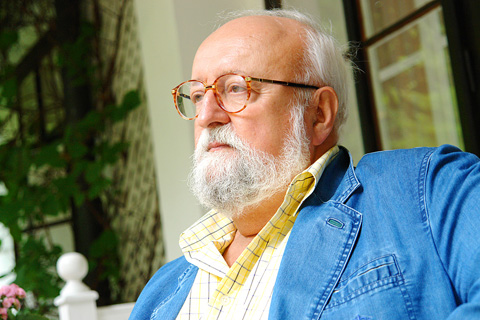The coup that the National Symphony Orchestra has brought off in getting Krysztof Penderecki to Taiwan deserves the highest praise.
Born in 1933, he became famous for writing avant-garde music when his native country was still under Soviet control. The Soviet authorities had always insisted that only traditional, tuneful music with a strong political message belonged within their empire. But when Penderecki, at the age of 27, penned a work Threnody to the Victims of Hiroshima in agonized ultra-modernist, John Cage-like style, his name was made, in the West at least.
What he brings to Taiwan tonight and tomorrow evening will be very different, however. The central items in both concerts feature a solo French horn, and that Penderecki has moved from his youthful experimentalism to a more traditional romanticism is well-known. The French horn, despite earlier associations with hunting, is as atmospheric an instrument as you can find anywhere.

PHOTO: COURTESY OF NSO
Penderecki's Horn Concerto, the centerpiece of tonight's concert in Taipei's National Concert Hall, was only unveiled in Bremen, Germany, earlier this month, and this will be its Asian premiere. The soloist then was the same we will hear in Taipei tonight, Croatian-born Radovan Vlatkovic, one of the world's most recorded horn players.
And tomorrow evening's concert in the Recital Hall will be another horn extravaganza, featuring Mozart's Horn Quintet (K.407), Brahms's Horn Trio (Opus 40), and Penderecki's Sextet for horn, clarinet, piano, violin, viola and cello. Vlatkovic also played in the premier of this work (in Vienna in 2000) with none other than Rostropovich, another old friend of Taiwan's, on the cello.
These two concerts are both musts for any classical music enthusiast. To hear Vlatkovich play the three chamber pieces tomorrow will be a unique pleasure, and the thought that Penderecki himself will have coached the players in his own item will add a unique flavor. And the great man will himself conduct tonight's larger-scale concert, which also includes his Sinfonietta for Strings and Beethoven's Seventh Symphony.
Tonight's concert is in Taipei's National Concert Hall, starting at 7.30pm. Tickets are NT$400 to NT$1,500. Tomorrow's concert is in Taipei's Recital Hall, also at 7.30, with tickets NT$300 to NT$500. For booking go to www.artsticket.com.tw, or call (02) 3393-9888.

Nov. 11 to Nov. 17 People may call Taipei a “living hell for pedestrians,” but back in the 1960s and 1970s, citizens were even discouraged from crossing major roads on foot. And there weren’t crosswalks or pedestrian signals at busy intersections. A 1978 editorial in the China Times (中國時報) reflected the government’s car-centric attitude: “Pedestrians too often risk their lives to compete with vehicles over road use instead of using an overpass. If they get hit by a car, who can they blame?” Taipei’s car traffic was growing exponentially during the 1960s, and along with it the frequency of accidents. The policy

What first caught my eye when I entered the 921 Earthquake Museum was a yellow band running at an angle across the floor toward a pile of exposed soil. This marks the line where, in the early morning hours of Sept. 21, 1999, a massive magnitude 7.3 earthquake raised the earth over two meters along one side of the Chelungpu Fault (車籠埔斷層). The museum’s first gallery, named after this fault, takes visitors on a journey along its length, from the spot right in front of them, where the uplift is visible in the exposed soil, all the way to the farthest

While Americans face the upcoming second Donald Trump presidency with bright optimism/existential dread in Taiwan there are also varying opinions on what the impact will be here. Regardless of what one thinks of Trump personally and his first administration, US-Taiwan relations blossomed. Relative to the previous Obama administration, arms sales rocketed from US$14 billion during Obama’s eight years to US$18 billion in four years under Trump. High-profile visits by administration officials, bipartisan Congressional delegations, more and higher-level government-to-government direct contacts were all increased under Trump, setting the stage and example for the Biden administration to follow. However, Trump administration secretary

The room glows vibrant pink, the floor flooded with hundreds of tiny pink marbles. As I approach the two chairs and a plush baroque sofa of matching fuchsia, what at first appears to be a scene of domestic bliss reveals itself to be anything but as gnarled metal nails and sharp spikes protrude from the cushions. An eerie cutout of a woman recoils into the armrest. This mixed-media installation captures generations of female anguish in Yun Suknam’s native South Korea, reflecting her observations and lived experience of the subjugated and serviceable housewife. The marbles are the mother’s sweat and tears,